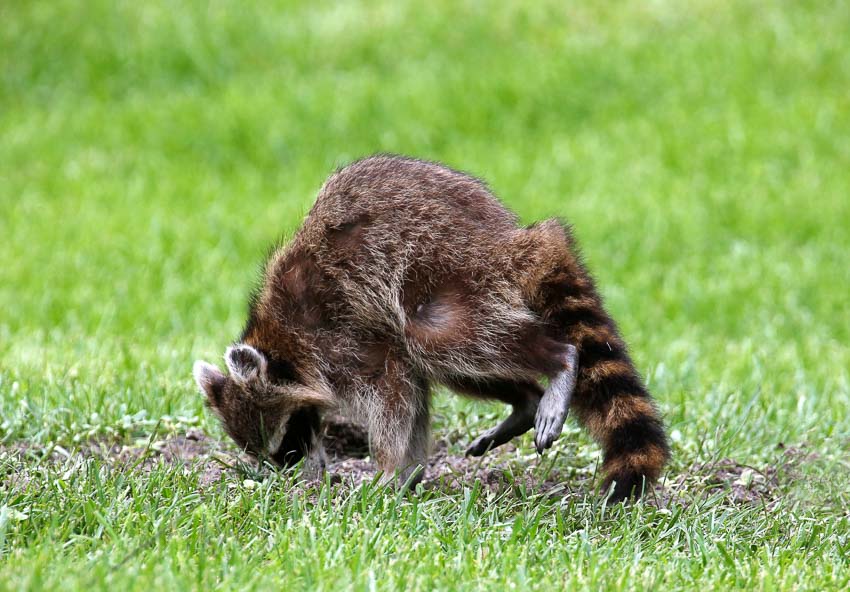If your yard looks like a construction zone or battlefield due to the persistent digging of critters, it’s time to learn how to stop them in their tracks. Find out how to stop animals from digging in your yard with these tips and tricks.
Why Animals Might Be Digging in Your Yard
The first step in stopping the incessant digging in your yard is to discover why this behavior occurs. Here are some of the most common reasons animals dig in your yard.
Natural Instincts
All types of animals have an instinct to dig. Sometimes dogs dig in your yard for no apparent reason, but it’s part of their natural instincts to dig holes for food, shelter, and nesting.
Search for Food
The search for food is a primary reason that animals like raccoons and gophers dig in your yard. They’re just trying to find a good meal, and your lawn provides it to them.
Shelter and Nesting
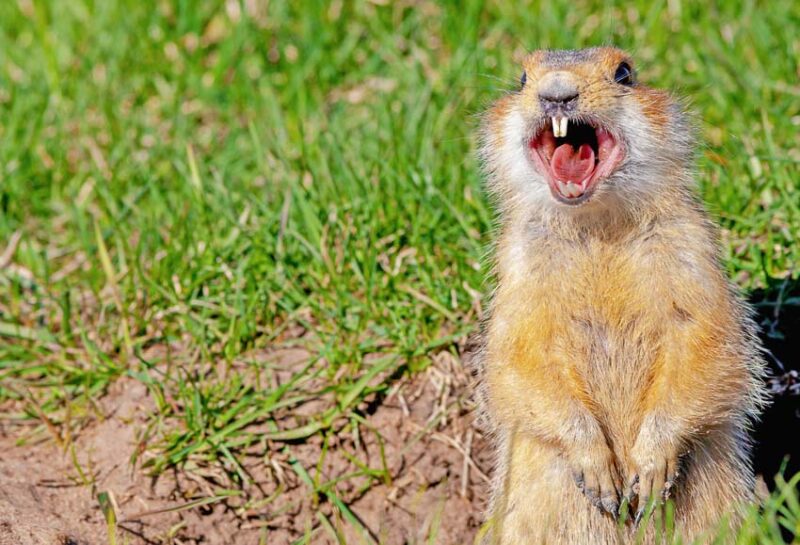
Many small burrowing animals, like skunks, moles, voles, and gophers, dig for shelter and nesting. If your yard seems like a good place to call home, animals might be digging to see if they can move in.
Marking Territory
Some animals dig or scrape the ground to mark the boundaries of their territory. Even domesticated dogs, especially ones that aren’t spayed or neutered, will dig up parts of your yard to ward off other animals.
Curious as to whether dog pee kills grass? We have the answer.
Health and Hygiene
Many species of birds are infamous for making holes in your yard to take dust baths. Birds like domesticated chickens and wild turkeys create shallow depressions and fluff their feathers in the dirt.
Other animals, including dogs and raccoons, roll in the soil as part of their natural grooming habits. The dirt helps remove oils and odors and control parasites.
What Animals Might be Digging in the Yard and How to Identify Them
The first step to getting rid of animals digging holes in your yard is identification. Learn about animals that dig holes in yards and how to identify them.
Common Yard-Digging Culprits
Apart from domesticated cats and dogs, several wild animals have a reputation for frequent yard digging.
Raccoons
The raccoon is one of the most common culprits of yard digging. They usually dig in your yard for grubs, and they can wreak all kinds of havoc on your property. They’re extremely destructive to lawns because they’re strong enough to lift chunks of sod and turn them over.
Skunks
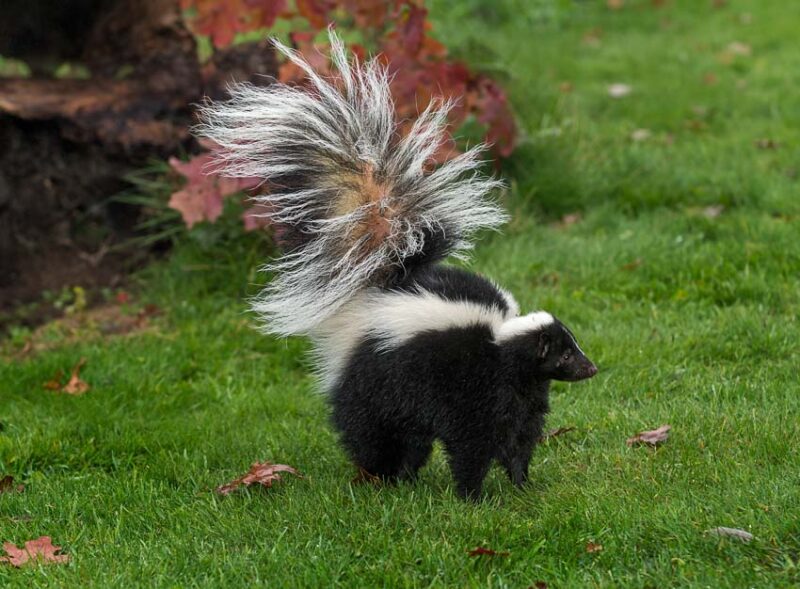
The skunk is another animal that frequently digs holes in yards. Working at night, skunks dig small cone-shaped holes, typically about three to four inches wide. They frequently dig for grubs in your lawn, but they’ll also get into compost piles or dig up ant nests and underground wasp hives.
Squirrels
The busiest creature in the world is the squirrel. They spend all of their waking moments searching for food sources and finding places to hide them. A squirrel is the most likely culprit if you find small holes in your yard filled with pinecones or chestnuts.
Moles, Voles, and Gophers
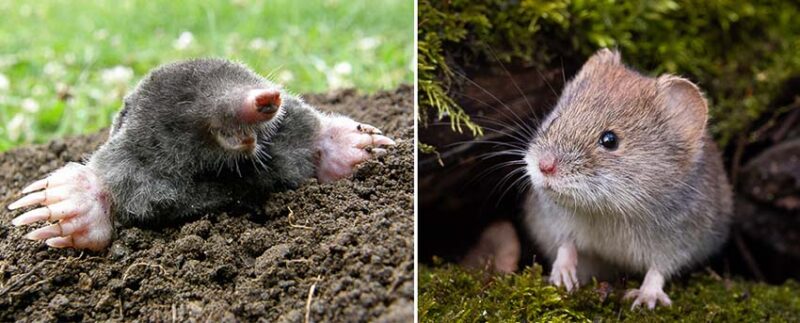
Voles and moles are small burrowing animals. Moles and gophers are likelier to be the animal digging culprits because voles don’t dig as much.
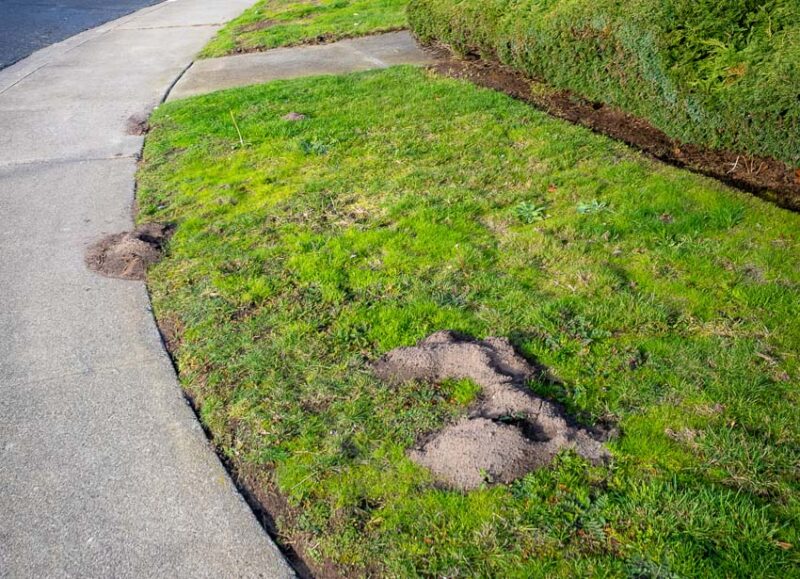
Gophers and moles are both very destructive, digging long tunnels and pushing piles of dirt up into your lawn.
Groundhogs and Ground Squirrels
Depending on where you live, you may have to deal with getting rid of groundhogs or ground squirrels. They’re closely related, and unlike moles, voles, and gophers, they both hibernate. They dig holes in your yard for nesting and storing grass, leaves, twigs, and roots.
Identifying the Culprit
Identification is essential for implementing a targeted eradication solution. Here are some tips to help you identify the animal that’s digging holes in your yard.
Set Up Cameras
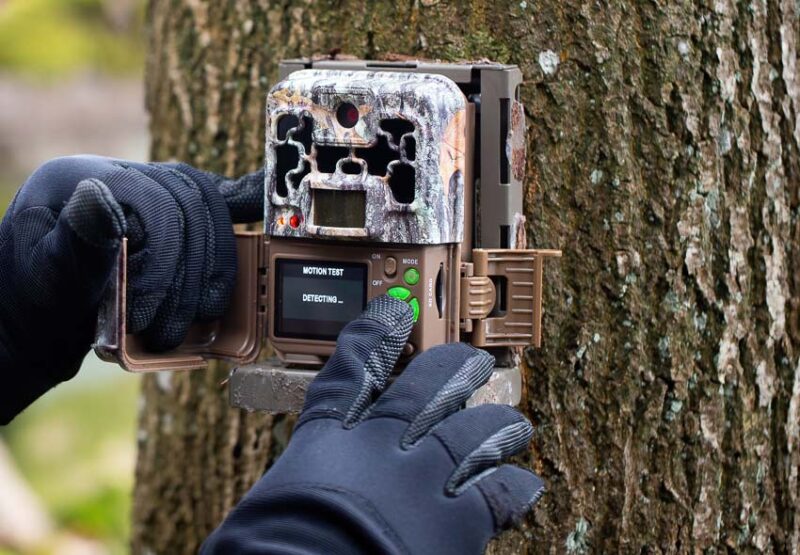
Small trail cameras are inexpensive and can be set up quickly. Within a few nights, you should be able to find out who the culprit is. Or, if you have an extra home security camera, use that.
Tracks and Footprints
Look for footprints and tracks in the dirt around the area that’s been dug. There are numerous online resources and field guides to help you identify tracks. Take a picture to aid in identification.
Dens and Burrows
Look for nearby dens and burrows. You may not be able to find them, but you should keep your eye out for clues about where the animal is sleeping or nesting.
Skunks often like to burrow underneath an outbuilding. If it’s a raccoon, it could be making a home in your attic, so that’s another good place to check.
Scat and Droppings
Just like tracks, scat is a great tool for identifying animals. If you find any unusual scat or droppings, take a picture so you can use online field guides to identify them.
Visual Observations
If you see a raccoon digging up your lawn at night, it’s easy to tell they’re the culprit. Even just seeing one in your neighborhood is a good sign that’s who is digging in your yard.
Tips for Stopping Animals from Digging in the Yard
Once you know what type of animal is digging in your yard, it’s easier to find the right method to get rid of them. Many natural repellents and deterrents work on several species, but finding the right solution can be tricky.
Creating a Digging Deterrent to Stop Animals in Your Yard
Modifying your yard to discourage animals from digging is one of the best ways to tackle this problem.
Choose Animal-Repelling Plants

Most wild animals don’t like strong-smelling plants, and they’re less likely to come into your yard; especially when you use plants as borders:
- Lavender
- Yarrow
- Rosemary
- Garlic
- Lemongrass
- Basil
- Onions
- Pennyroyal
- Peppermint
Install Barriers and Fencing
You might be unable to stop animals from digging in your yard with barriers and fencing, but you can make it tougher on them. Raccoons, skunks, squirrels, and gophers are good climbers, so a cat-proof fence is the best choice.
Want more fencing options? Explore our comprehensive guide to in-ground dog fencing.
Use Natural Repellents
Besides repellent plants, you can use various other natural repellents. Natural repellents include essential oil sprays, vinegar sprays, and dog hair. Some of the best store-bought repellents have predator urine in them. When small animals get a whiff of coyote or mountain lion urine, they stay away.
Modify Habitat
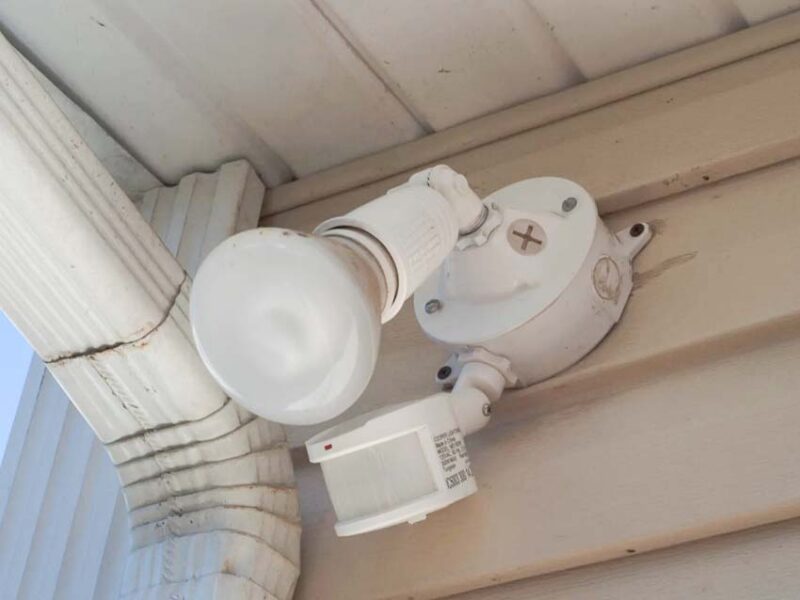
You can discourage animals from digging in your yard by modifying the habitat. Install motion-activated sprinklers and lights, or put a radio in your yard for sound at night.
Safe and Humane Trapping
Using traps to stop animals from digging isn’t as effective as deterrents because as soon as you trap and remove one, another can appear in its place. However, as a last resort, it’s worth knowing your options.
Trapping Techniques
Humane trapping techniques are preferable. Here are some suggestions:
- Use live traps
- Use the right bait for the animal you’re targeting
- Check the traps regularly
- Have a plan for the animal’s release
Handle animals with care and keep in mind that they’re frightened. Avoid sudden movements around trapped animals.
Relocation or Release
Some states don’t allow trapping and releasing, and many areas require that you release animals under certain guidelines.
You may also capture someone’s pet or a non-target animal. If that happens, release them immediately.
Professional Assistance
If you’re unsure about trapping laws in your state, contact a local pest control company. Some states only allow trapping by licensed professionals.
Maintaining a Well-Kept Yard
Another way to make animals feel less comfortable in your yard is to keep it well-maintained.
Regular Yard Maintenance
Regular yard maintenance should include trimming trees, shrubs, and flowerbeds and keeping your lawn neatly mowed. With less cover, animals feel less safe from natural predators.
Proper Trash Disposal
Trash is the number one attractant of raccoons. Use trash cans with tight-fitting lids and place motion-activated sprinklers near your trash can area.
Secure Pet Food and Trash Bins
If you’ve been feeding your pet outside on the porch, the food is probably attracting raccoons and skunks. Bring your pet food indoors, or only give them small amounts of food they can immediately consume. Keep your pet food and trash cans in your garage.
Educating Your Community
Sometimes, your neighbors work against your best efforts. Learn how to enlist their cooperation and find ways to educate your community about responsible pet ownership.
Neighbors’ Cooperation
If the animal responsible for digging in your yard is your neighbor’s dog, it can be pretty frustrating. Cool down before you talk with your neighbor so you can take a solution-oriented approach.
When talking to your neighbor, ask them for help instead of demanding they do something. They’ll likely be happy to do what it takes to stop the digging and be good neighbors.
Promote Responsible Pet Ownership
Collaborate with veterinarians and pet shelters in your community to promote education about responsible pet ownership. You can hold events, have a booth at the fair, or put brochures on bulletin boards in your neighborhood.
Additional Considerations When Trying to Stop Animals from Tearing up the Yard
You may encounter other issues when you’re trying to keep animals from digging in your yard. The following information addresses legal and ethical concerns and provides ideas about how to find professionals in your area.
Legal and Ethical Concerns
Humans and wildlife share habitat in many areas, and there are legal and ethical concerns regarding how you get rid of problem animals on your property.
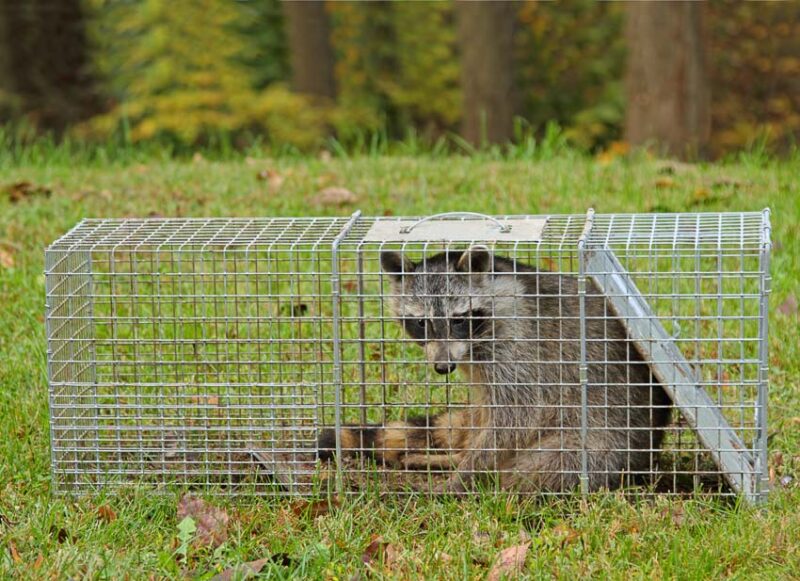
Many states regulate trapping and relocation, and federal wildlife protection laws govern the ethical treatment of animals. Talk to the local fish and wildlife service if you need assistance or have any questions.
Seeking Professional Help
Pest control and wildlife rehabilitation centers provide services you can use when you’re having problems with wildlife. Pest control professionals are savvy about many types of common pests. In many cases, it’s safer for you and the animal to hire a professional.
Long-Term Solutions
Seek long-term solutions for your wildlife problems. If you change your landscape design and install better fencing, it can alleviate many of the problems. Also, instituting a plan to address the grubs in your lawn is another great solution.
Continue to monitor the wildlife in your yard, and live with them as much as possible. And when they cross the line, find humane solutions to stop them.
FAQs about “How to Stop Animals from Digging in Yard”
How can I tell what is digging up my yard at night?
Skunks and raccoons are the two most common wild animals that dig holes in your yard. Skunk holes in the grass are small, about three to four inches in diameter. Raccoons dig deeper holes and can even flip over pieces of sod.
What animal digs small holes in my lawn at night?
If you find small holes in your yard in the morning, it’s probably from a skunk digging for lawn grubs. If you have a grub infestation in your lawn, there’s almost no way to deter skunks from digging in your grass. It takes time to address grub problems naturally with nematodes.
Once animals start digging for grubs, it may already be too late to treat for grubs. Plan ahead and apply products like Scott’s GrubEx in spring and early summer.
How do I stop possums from digging up my lawn?
To stop opossums from digging in your yard, you must make your yard less appealing. Get rid of attractants, like food sources and water, and use natural repellents. Strong odors such as garlic, onion, vinegar, and peppermint naturally repel many unwanted critters.
What should I do if I find raccoon holes in my grass?
When raccoons destroy your lawn, it’s time to eliminate them from your yard. You can get rid of raccoons by making your yard less attractive to them by removing food sources and setting up motion-detecting lights and sprinklers.
Are there any animals that dig for grubs in lawns?
Skunks and raccoons are the usual culprits digging for the grubs in your lawn. Since they are both mostly nocturnal, much of their digging activity occurs at night.

